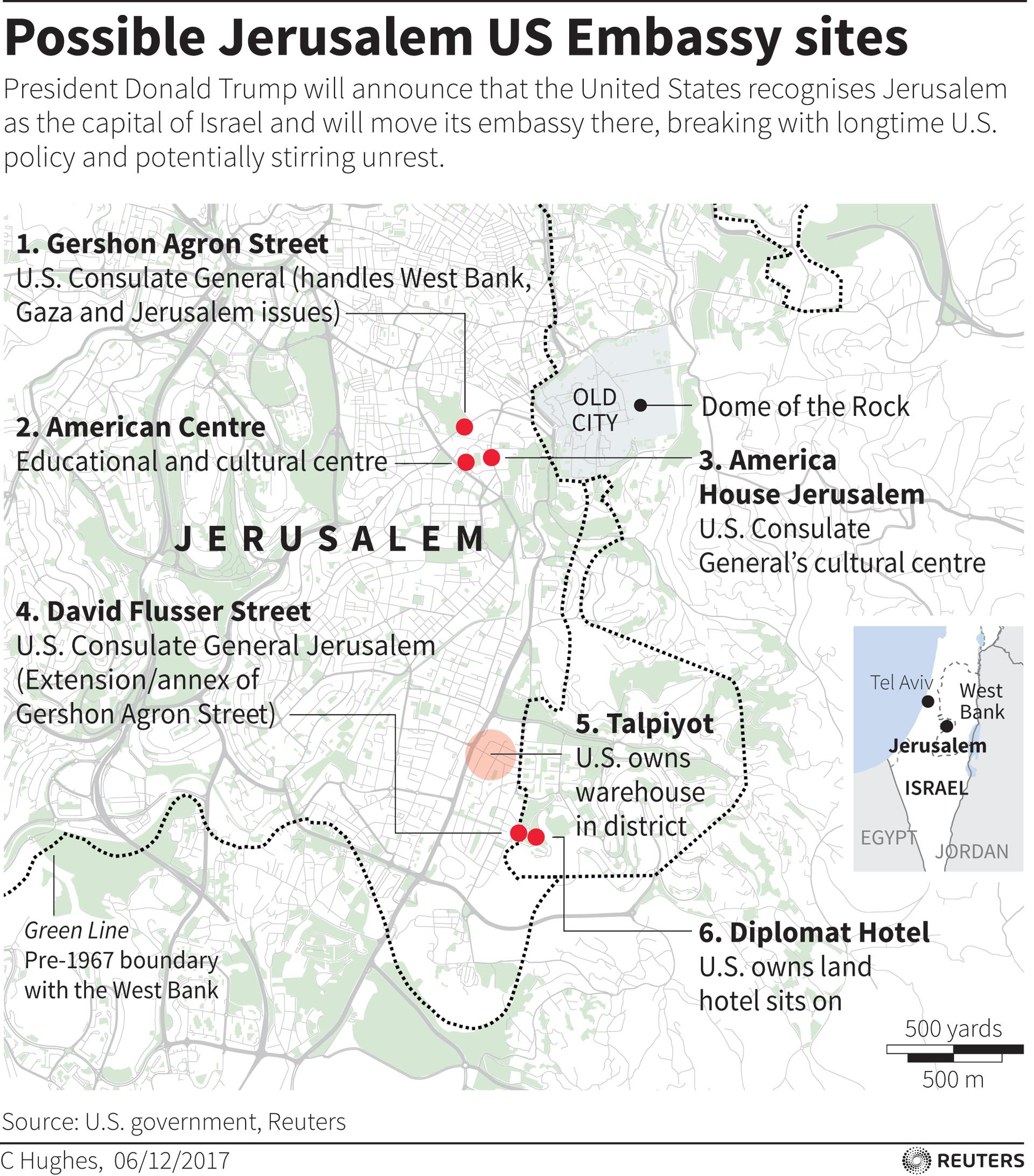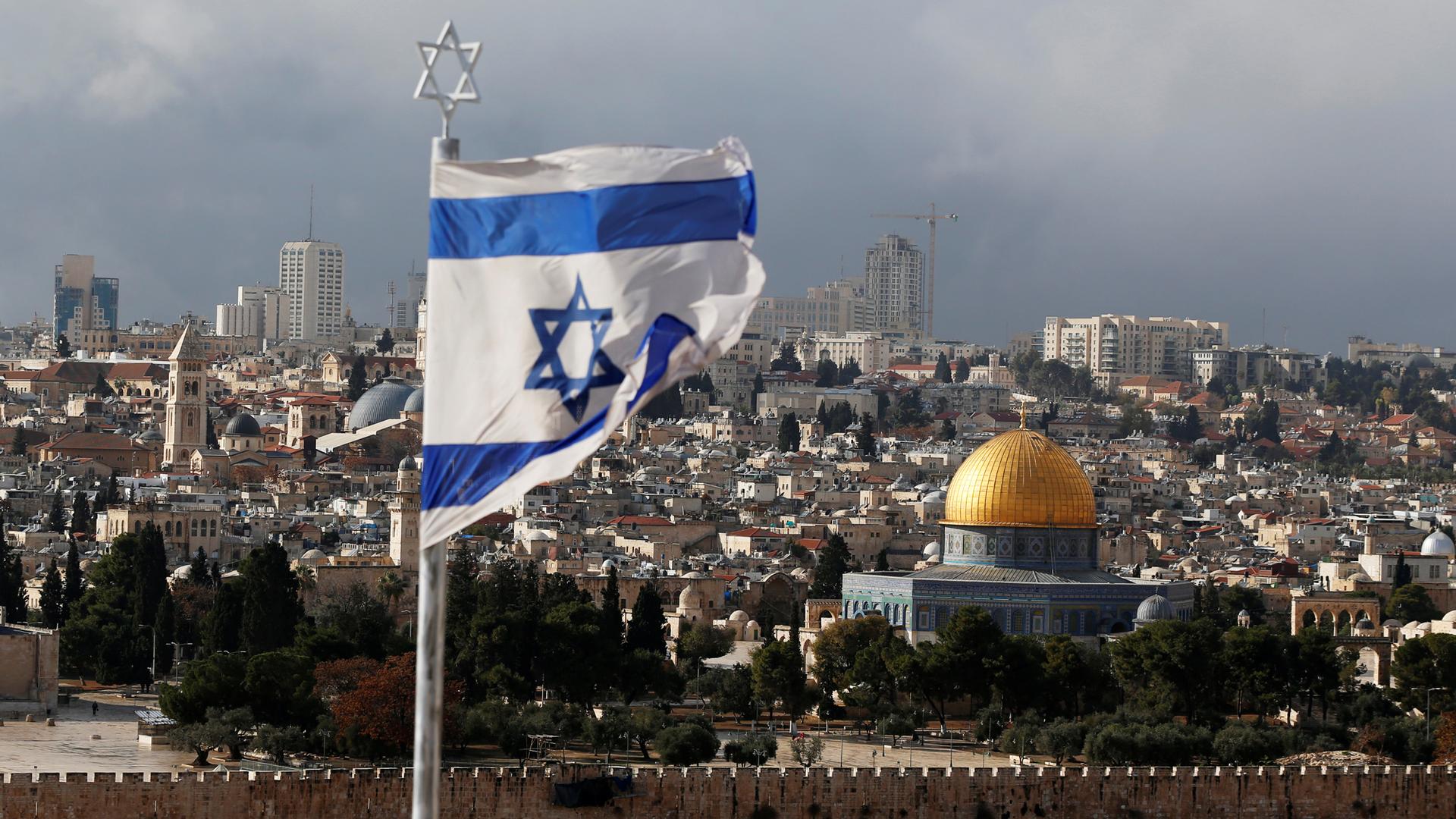Trump recognizes Jerusalem as Israel’s capital, but commits to peace in face of backlash
An Israeli flag is seen near the Dome of the Rock, located in Jerusalem's Old City.
President Donald Trump reversed decades of U.S. policy on Wednesday and recognized Jerusalem as the capital of Israel, despite warnings from around the world that the gesture further drives a wedge between Israel and the Palestinians.
In a speech at the White House, Trump said his administration would also begin a process of moving the U.S. embassy in Tel Aviv to Jerusalem, which is expected to take years.
The status of Jerusalem — home to sites holy to the Muslim, Jewish and Christian religions — has been one of the thorniest issues in long-running Mideast peace efforts.
Israel considers the city its eternal and indivisible capital and wants all embassies based there. Palestinians want the capital of an independent Palestinian state to be in the city's eastern sector, which Israel captured in the 1967 Middle East war and annexed in a move never recognized internationally.
Trump's decision is likely to please his core supporters — Republican conservatives and evangelical Christians who comprise an important share of his political base.
Trump aides contend the move reflects the reality of Jerusalem as the center of Jewish faith and the fact that the city is the seat of the Israeli government.
Trump called his decision a "a long overdue" step to advance the peace process.
"I have determined that it is time to officially recognize Jerusalem as the capital of Israel," Trump said. "While previous presidents have made this a major campaign promise, they failed to deliver. Today, I am delivering."
Trump acted under a 1995 law that requires the United States to move its embassy to Jerusalem. His predecessors, Bill Clinton, George W. Bush and Barack Obama, had consistently put off that decision to avoid inflaming tensions in the Middle East.

“The president believes this is a recognition of reality,” said one official, who briefed reporters on Tuesday about the announcement. "We’re going forward on the basis of a truth that is undeniable. It’s just a fact."
Senior Trump administration officials said Trump's decision was not intended to tip the scale in Israel's favor and that agreeing on the final status of Jerusalem would remain a central part of any peace deal between Israel and the Palestinians.
In defending the decision, the officials said Trump was basically reflecting a fundamental truth: That Jerusalem is the seat of the Israeli government and should be recognized as such.
The Palestinians have said the move would mean the "kiss of death" to the two-state solution.
The political benefits for Trump are unclear. The decision will thrill Republican conservatives and evangelical Christians who make up a large share of his political base.
But it will complicate Trump's desire for a more stable Middle East and Israel-Palestinian peace and arouse tensions. Past presidents have put off such a move.
The mere hint of his decision to move the embassy in the future set off alarm bells around the Middle East, raising the prospect of violence.
"Our Palestinian people everywhere will not allow this conspiracy to pass, and their options are open in defending their land and their sacred places," said Hamas chief Ismail Haniyeh.
Islamist militant groups such as al-Qaeda, Hamas and Hezbollah have in the past tried to exploit Muslim sensitivities over Jerusalem to stoke anti-Israel and anti-US sentiment.
'Serious Implications'
The decision comes as Trump's senior adviser and son-in-law, Jared Kushner, leads a relatively quiet effort to restart long-stalled peace efforts in the region, with little in the way of tangible progress thus far.
"The president will reiterate how committed he is to peace. While we understand how some parties might react, we are still working on our plan which is not yet ready. We have time to get it right and see how people feel after this news is processed over the next period of time," one senior official said.
Trump spoke to Palestinian President Mahmoud Abbas, Israeli Prime Minister Benjamin Netanyahu, Jordan's King Abdullah and Saudi King Salman to inform them of his decision.
The Jordanian king "affirmed that the decision will have serious implications that will undermine efforts to resume the peace process and will provoke Muslims and Christians alike," said a statement from his office.
The international community does not recognize Israeli sovereignty over the entire city, home to sites holy to the Muslim, Jewish and Christian religions.
“We have always regarded Jerusalem as a final-status issue that must be resolved through direct negotiations between the two parties based on relevant Security Council resolutions," United Nations spokesman Stephane Dujarric told reporters.
No other country has its embassy in Jerusalem.
Trump has weighed US policy toward Israel since taking office in January, considering the Jewish state a strong ally in a volatile part of the world.
Still, deliberations over the status of Jerusalem were tense. Vice President Mike Pence and David Friedman, US ambassador to Israel, pushed hard for both recognition and embassy relocation, while Secretary of State Rex Tillerson and Defense Secretary Jim Mattis opposed the move from Tel Aviv, according to other US officials who spoke on condition of anonymity.
An impatient Trump finally weighed in, telling aides last week he wanted to keep his campaign promise.
Abbas warned Trump of the “dangerous consequences” that moving the embassy would have for peace efforts and regional stability, Abbas spokesman Nabil Abu Rdainah said.
But Trump assured Abbas that he remained committed to facilitating an Israeli-Palestinian peace deal, one US official said.
Additional reporting by Roberta Rampton, Matt Spetalnick and John Walcott in Washington and Michelle Nichols at the United Nations; Editing by Yara Bayoumy and and Peter Cooney.
We want to hear your feedback so we can keep improving our website, theworld.org. Please fill out this quick survey and let us know your thoughts (your answers will be anonymous). Thanks for your time!
